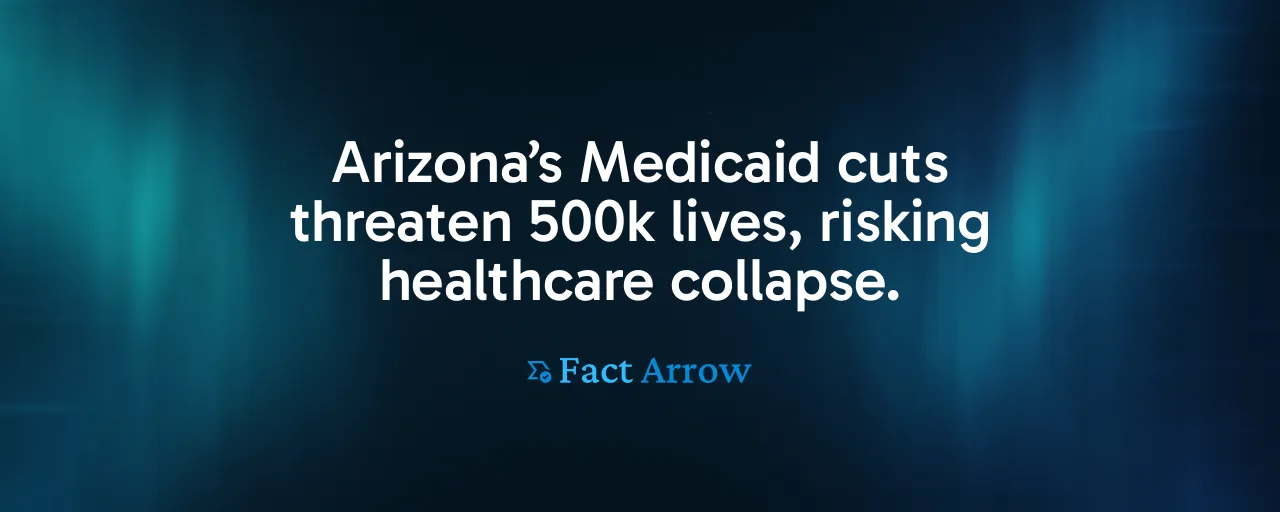A Devastating Blow to Arizona Families
Congress passed the 'One Big Beautiful Bill Act' on July 1, 2025, a sweeping tax-and-spending package that promises tax cuts but delivers a gutting blow to Arizona's most vulnerable. The measure slashes $930 billion from Medicaid and $300 billion from SNAP, the food assistance program. Arizona Governor Katie Hobbs warned that the bill will strip health coverage from over half a million residents and leave 190,000 struggling to put food on the table. The policy creates a crisis for families already stretched thin.
The cuts target programs that anchor Arizona's safety net. Medicaid, known as AHCCCS, covers one in three Arizonans, including children, seniors, and working adults. SNAP feeds 914,000 people, nearly half of them kids. These numbers represent real people: single parents, rural retirees, and small-business employees who rely on these programs to survive. The bill's passage sparked outrage among advocates who see it as a betrayal of working families.
Arizona's unique Medicaid structure makes the state especially vulnerable. A state law triggers an automatic rollback of coverage if federal funding dips below 80 percent. With the bill dropping the federal match to 64 percent, Arizona faces a $1.9 billion shortfall. This forces impossible choices: raise taxes, cut other services, or let hospitals and families collapse under the weight of uncompensated care.
Rural Hospitals on the Brink
Rural Arizona stands to lose the most. Hospitals in small towns rely on Medicaid for up to 60 percent of their revenue. The funding cuts threaten to shutter critical-access facilities, leaving entire communities without emergency rooms or maternity care. The University of Arizona's Center for Rural Health predicts closures in areas where Medicaid is the dominant payer, creating health care deserts that force residents to drive hours for basic treatment.
The ripple effects are staggering. When rural hospitals close, jobs vanish, and local economies crumble. Arizona's $38 billion health care sector could contract by $3.7 billion, with 36,000 jobs at risk. Private insurance premiums are projected to rise 8 to 12 percent as hospitals shift costs to insured patients. This issue extends beyond rural areas, posing a statewide economic threat that hits every Arizonan's wallet.
Advocates argue that protecting rural health care demands maintaining the 90 percent federal match for Medicaid expansion. Higher reimbursement rates and targeted stabilization grants could keep hospitals afloat. Instead, the bill offers a meager $50 billion carve-out for rural facilities nationwide, far short of what Arizona needs to avoid catastrophe.
Food Insecurity Surges
The SNAP cuts are equally dire. The bill reduces benefits for 190,000 Arizonans and shifts some costs to states starting in 2028. For families already scraping by, this means meals reduced to $2 per person, with no adjustment for rising food prices. Children, seniors, and veterans face the brunt, as food pantries, already stretched thin, brace for record demand.
Historical data shows SNAP's value. During the 2020 pandemic, expanded benefits slashed child hunger rates. Reversing these gains risks long-term harm, from developmental delays in kids to chronic illness in adults. Advocates for food security insist that preserving broad eligibility and indexing benefits to inflation is non-negotiable. Arizona's 378,000 children on SNAP deserve better than policy that leaves them hungry.
A Legacy of Resilience
Arizona's fight for health and food security isn't new. Voters approved Medicaid expansion in 2013, transforming the state into a model for covering working adults. When Congress tried to gut Medicaid in 2017, Arizona's own Senator John McCain cast a decisive vote to stop it. That spirit of resistance lives on in Governor Hobbs, who has expanded postpartum care and built a state-run ACA marketplace to shield residents from federal volatility.
The scale of this challenge dwarfs past battles. The bill echoes the Heritage Foundation's 'Project 2025' playbook, which prioritizes tax breaks over human needs. Arizona's $1.6 billion rainy-day fund covers less than a third of the Medicaid shortfall, and state officials warn of legal battles if federal cost-shifts violate constitutional protections. Without action, medical bankruptcies and food insecurity will soar.
Solutions Rooted in Fairness
Protecting Arizona's safety net requires bold action. Maintaining the 90 percent federal match for Medicaid expansion would preserve coverage for 550,000 adults. Making ACA premium credits permanent could stabilize insurance markets, preventing premium spikes. For SNAP, broad eligibility and inflation-adjusted benefits ensure families aren't forced to choose between groceries and rent.
Funding these priorities does not mean ballooning deficits. Closing tax loopholes for high earners could generate billions without burdening working families. Rural hospital grants, tied to higher Medicaid reimbursements, would secure care access while boosting local economies. These are investments in Arizona's future.
A Call to Act
Arizona faces a defining moment. The 'One Big Beautiful Bill Act' threatens to unravel decades of progress, leaving families, hospitals, and communities to pick up the pieces. However, the fight isn't over. Governor Hobbs and advocates are pressing the House to restore funding and prioritize people over tax cuts.
History shows Arizona's resilience. From voter-driven Medicaid expansion to McCain's stand in 2017, the state has defied odds to protect its own. Now, Arizonans must demand accountability from lawmakers, urging them to champion fairness and compassion in Washington.
The path ahead requires courage. By investing in health care and food security, Arizona can safeguard its families and build a stronger, more equitable future. The time to act is now, before the cuts tear apart the safety net that holds the state together.
